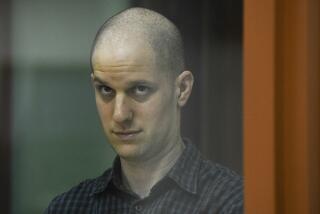Mock Trial Gives Russia Taste of the Jury System : Justice: L.A.-based group stages civil proceeding in Moscow. Reaction from judges and lawyers is favorable.
- Share via
MOSCOW — The jury foreman looked pained. He had just awarded a whopping 70 million rubles to the bereaved family of a hypothetical accident victim, and it was a strange new sensation to put a price tag on a man’s existence.
“When it came to assessing the value of human life, that was the hardest part for us,” foreman Lev Khaldeyev said. “In our country, no court had ever considered this.”
Now it has. In a ground-breaking legal exchange, the Los Angeles-based American Board of Trial Advocates held a mock civil jury trial in Moscow on Wednesday, introducing their Russian counterparts to the art of playing to the jury in classic “L.A. Law” style.
Russia has not had a full jury system since the 1917 Bolshevik Revolution, relying instead on two “people’s jurors” who flank the judge at the bench and, in practice, tend to rule exactly as the judge wishes.
Only recently, as part of sweeping legal reforms meant to give the courts back their independence after decades under the Communist Party’s thumb, has Russia passed laws allowing jury trials in criminal cases and begun to consider introducing them in civil cases as well.
“This is democracy at the lowest, grass-roots level,” argued Don Keenan, president of the American Board of Trial Advocates.
For decades, Russian law “has been anything but justice by the people,” Keenan said. “You had justice by bureaucracy, justice by pulling strings.”
The case selected for modern Russia’s first run-through of a civil jury trial, held at the national Law Academy, was typical enough: A factory engineer was killed when he was hit by a car as he crossed Moscow’s central Garden Ring Road, and the jury had to decide to what extent the driver was at fault and how much he should pay in damages. American trial lawyers argued both the plaintiff’s and the defendant’s side, but their most powerful appeals came on behalf of the jury system itself.
“The jury is great,” declared the plaintiff’s lawyer. “Every citizen has to give a little to make sure the right thing is done.”
The jury, made up of Russian judges and lawyers, decided that the driver deserved 70% of the blame and the pedestrian was 30% at fault for crossing carelessly. The award of 70 million rubles amounts to about $700,000 at current exchange rates; the jury decided that it could not put a price on a man’s life, so it simply took 70% of the 100 million rubles the bereaved wife’s lawyer had requested.
More important, the law professors and judges in the audience decided that there may be something to this jury system after all.
Helen Chefranova, a professor at the Law Academy, said she had opposed the idea of juries as complex, expensive and unsuited to Russian society, where powerful envy is a national trait.
“Everyone has such problems now,” she said. “And if the defendant is rich, the jury would be sure to condemn him. Juries are for societies of equals.”
Now, however, she said she is convinced that “complex vital questions can be decided by professionals, but I think we need people’s life wisdom to determine the facts.”
“Introducing the jury trial is a very important part of judicial reform,” said Nuriman Sharafetdinov, rector of the academy. “We want the courts to be objective, and the jury provides that element of objectivity.”
Keenan said he and his colleagues hope to help Russia avoid many of the pitfalls into which the American system has fallen in its civil jury system, including astronomical trial costs and frivolous lawsuits.
“Our role is to tell them what mistakes we made over the years so they don’t have to reinvent the wheel,” he said.
First, however, Keenan and other board members had to acquaint the Russians with the basics of the American system.
What happens, one Russian jurist asked, if the defendant lacks the money to pay the damages he is assessed? Another, unaware that nearly 90% of cases never actually come to trial in America, asked whether suits could be settled out of court.
Keenan explained the system of contingency fees, in which plaintiffs’ lawyers are paid not a salary but a percentage of the damages, and described the incentive to settle out of court as one of the greatest advantages of the jury trial.
He predicted that within five to 10 years, Russia could be running the kind of jury system that it has taken America the last 50 to develop.
More to Read
Sign up for Essential California
The most important California stories and recommendations in your inbox every morning.
You may occasionally receive promotional content from the Los Angeles Times.













